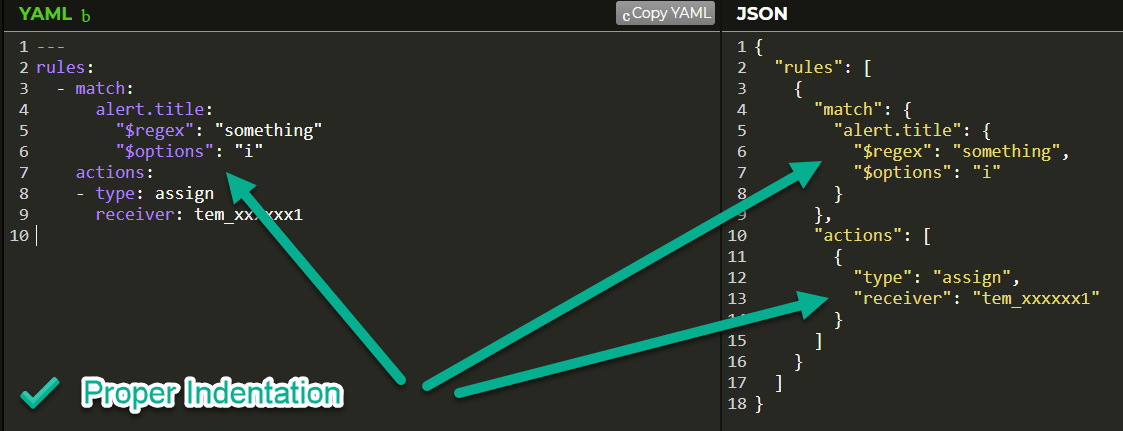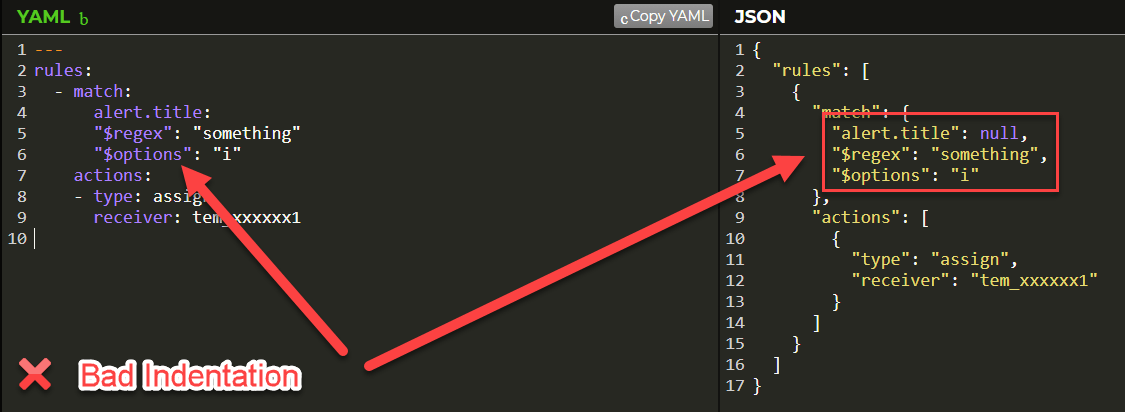Routers
What are Routers?
With routers, you can perform complex matching and actions on alerts. Routers consist of many router rules that are processed after the integration has transformed the 3rd party data into an alert, but before the alert has been assigned to the team.
- Routers are objects that can dynamically route alerts based on match conditions.
- Alerts are sent to a router either by an Integration or Account User.
- To access routers, you must enable "advanced mode".
- Router rules are evaluated in top down order.
- If no rules are matched, alerts are routed to the default receiver.
- Routers are written in YAML.

High Level Alert Workflow (Routers)
Routers Video
Rules Syntax
- rules - array - Always the root element - 1..n
- match - hash - 1 match condition (object) - 1
- actions - array - 1 or more actions to perform - 1..n
---
rules:
# array of rules
- match:
# ... properties to match
actions:
# ... array of actions
Match Block
The match block will attempt to match data using operators.
Data
When routers are matching rules they are given access to data.
{
always: true, // will always be true
alert: {...}, // the alert object being evaluated
log: { // the source log of the alert (if one exists)
// if the log was from a webhook based integration
// it will have the following properties
data: {...}, // the body of the request
headers: {...}, // the headers of the request
// if the log was from an email integration
// it will have the following properties
from: ["..."], // array of email addresses (but usually just one)
to: ["...", "..."], // array of email addresses
subject: "...", // text
body: "..." // raw body text
},
log_parsed: boolean, // a boolean indicating if PagerTree was able to parse the log to an object
}
Operators
Internally PagerTree uses the sift package to do rule matching. It follows the familiar MongoDB syntax.
- $in
- $nin
- $exists
- $gte
- $gt
- $lte
- $lt
- $eq
- $ne
- $mod
- $all
- $and
- $or
- $nor
- $size
- $type
- $regex (ECMAScript (JavaScript) regular expressions. Use regex101.com to test.)
- $elemMatch
- $not
There are 3 special functions that are supplemental.
$day
- Returns - ISO day of the week (1 Monday, 7 Sunday): integer.
- Parameters
- timezone - A valid momentjs timezone, default: Etc/UTC
$day:
timezone: "America/Los_Angeles"
$in:
- 6
- 7
$now
- Returns - Current datetime in the specified format: string.
- Parameters
- timezone - A valid momentjs timezone, default: Etc/UTC
- format - A valid momentjs string formats, default: YYYY-MM-DD
$now:
timezone: "America/Chicago"
format: "MM-DD"
$in:
- "01-01" # New Years
- "12-25" # Christmas
$timeBetween
- Returns - A boolean if the current time is between (inclusive) the time provided :boolean
- Parameters
- timezone - A valid momentjs timezone, default: Etc/UTC
- timeformat - A valid momentjs string formats, default: "hh:mm a"
- starttime - The start time to consider.
- endtime - The end time to consider.
Note: If the start time is after the end time, this simulates checking the over night time span.
$timeBetween:
timezone: "America/Los_Angeles"
timeformat: "hh:mm a"
starttime: "08:00 am"
endtime: "05:00 pm"
Actions Block
Action Types
- aggregate - Aggregate alerts based on fields.
- assign - Assign the alert to a team, router, or account user.
- ignore - Suppress the alert.
- incident - Mark the alert as an incident.
- setval - Set a value on the alert.
- stakeholder - Attach a stakeholder to the alert.
Aggregate
The aggregate function will aggregate alerts by the specified by properties for timeout amount of time. The first alert will be immediately routed to the receiver and all subsequent alerts that arrive matching the aggregate by will be added as a child to the first alert and immediately discarded.
Parameters
- by - array - properties to generate a fingerprint from
- timeout - string - ms notation of the duration to aggregate alerts for.
- receiver - string - account user, router, or team Prefix ID to route the initial alert to.
- type: aggregate
by:
- alert.urgency
timeout: 5m
receiver: tem_xxxxxx
Assign
The assign function will assign the alert to an account user, router or team.
Parameters
- receiver - string|array - account user, router, or team Prefix ID to route the alert to.
- delay - string - ms notation of the duration to delay the initial routing. (Useful if alerts tend to self heal)
# default syntax, assign to one value (user, team, router, schedule)
- type: assign
receiver: usr_xxxxxx1
# advanced syntax, assign to multiple receivers, and add a delay
- type: assign
receiver:
- usr_xxxxxx1
- tem_xxxxxx1
delay: 5m
Ignore
The ignore function will change the alert's status to suppressed and stop routing.
- type: ignore
Incident
The incident action will mark the alert as an incident.
Parameters
- severity - string - A valid severity level of the incident (SEV-1|SEV-2|SEV-3|SEV-4|SEV-5|SEV-UNKNOWN)
- message - string - The special incident message that will be displayed at the top of the alert page.
- handlebars - boolean - Boolean indicating severity and message should use handlebars notation.
# simple example
- type: incident
severity: SEV-2
message: Please join the call - https://mycallsoftware.com/call/123
# example using handlebars notation
- type: incident
handlebars: true
severity: "{{log.data.commonLabels.severity}}"
message: Please join the call - https://mycallsoftware.com/call/123
Setval
The setval action will assign data to the alert. Define a custom title, description, tags, or urgency.
Parameters
- map - hash - Allowed keys: title, description, tags, and/or urgency.
- handlebars - boolean - Boolean indicating title and description should use handlebars notation.
# simple example
- type: setval
map:
title: I just changed the title!
tags:
- some
- cool
- tags
# example using handlebars notation
- type: setval
handlebars: true
map:
title: I just changed the title!
description: "See the alert {{log.data.external_url}}"
tags:
- some
- cool
- tags
Stakeholder
The stakeholder action will attach stakeholders to the alert.
Parameters
- ids - array - Stakeholder Prefix IDs
- type: stakeholder
ids:
- stk_xxxxx1
Putting It All Together
Attach the Router to your Integration
When you are happy with your router definition you must connect the Integration to the Router.
For each integration that should use your routers logic:
- Edit the Integration
- Change the Destinations to be your new router
- Click Save
Examples
Example #1 Always Aggregate By Source
- Matches everything
- Aggregates by unique alert.source_id (usually a integration or user) for a period of 1 hour
- Assigns the alert to team tem_xxxxxx1
# match always, grouping by the source (integration or account user) for 1 hour. Send it to tem_xxxxxx1.
---
rules:
- match:
always: true
actions:
- type: aggregate
by:
- alert.source_id
timeout: 1h
receiver: tem_xxxxxx1
Example #2 Critical System Down Router
- Matches any alert with "Critical Systems Down" (case insensitive) in the title and the urgency of high or critical.
- Attaches stakeholder stk_xxxxx1 to the alert.
- Assigns the alert to team tem_xxxxxx1 with 5 minute delay to allow for self healing.
# match critical system alerts (w/ urgency high or critical). Attach stakeholders and assign to tem_xxxxxx1 with a 5 minute delay
---
rules:
- match:
alert.title:
"$regex": "Critical Systems Down"
"$options": "i" # case insensitive
alert.urgency:
"$in":
- high
- critical
actions:
- type: stakeholder
ids:
- stk_xxxxx1
- type: assign
receiver: tem_xxxxxx1
delay: 5m
Example #3 Aggregate by Title
- Matches any alert with "staging" (case sensitive) in the title.
- Aggregates by unique alert.title for a period of 1 day.
- The first occurrence of each unique title will be routed to tem_xxxxxx1.
# Aggregate staging alert by unique title everyday. Send to tem_xxxxxx1.
---
rules:
- match:
alert.title:
$regex: "staging" # case sensitive
actions:
- type: aggregate
by:
- alert.title
timeout: 1d
receiver: tem_xxxxxx1
Example #4 Office Hours
- Matches current time of day between 8a-5p, M-F (Europe/London) and routes to tem_xxxxxx1.
- If outside of office hours, the alert is ignored.
This router makes use of the $and, $timeBetween, $day and $in operators.
# Send alerts created between 8a-5p M-F Europe/London time to team tem_xxxxxx1. Ignore everything else.
---
rules:
- match:
$and:
- $timeBetween:
timezone: "Europe/London"
timeformat: "hh:mm a"
starttime: "08:00 am"
endtime: "05:00 pm"
# Monday - Friday
- $day:
timezone: "Europe/London"
$in:
- 1
- 2
- 3
- 4
- 5
actions:
- type: assign
receiver: tem_xxxxxx1
- match:
always: true
actions:
- type: ignore
Common Errors
Routers are some of the most complex pieces of PagerTree. If you run into issues make sure to check out the Router Workflows and their logs.
Forgot to Set Integration Destination
Many times a customer has written the router correctly but forgets to set the integration destination as the router.
Don't forget to point the integrations that should use the router logic to point to your router!
Bad Indentation
A common error when configuring routers is that the YAML is not formatted correctly (mostly always indentation). You can use the JSON2YAML tool to check your indentation.

Good Router Indentation

Bad Router Indentation